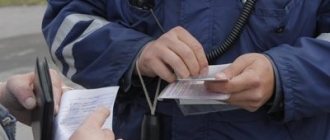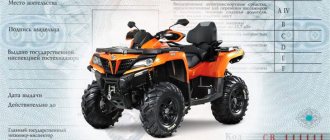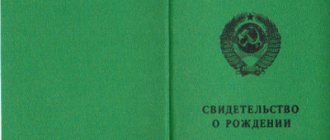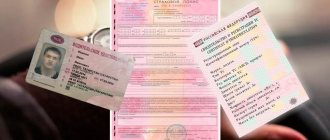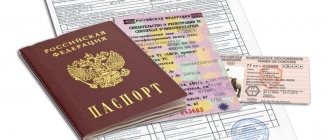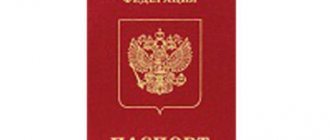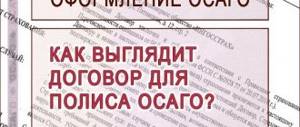Document verification: duties and rights of a citizen
“Citizen, show your documents” - this phrase, popular in Soviet films, can often be heard in real life. Let's try to figure out in what cases a police officer has the right to check documents and what rights an ordinary citizen has.
Just like that, without any reason, police officers do not have the right to check the documents of passers-by.
The whole question is: what is such a basis?
We will prepare a complaint against the actions of police officers
Urgent Competently Confidential
Order a complaint
Grounds for checking documents by a police officer
The grounds for checking documents are regulated in detail by law and, above all, by the Federal Law “On the Police”.
According to clause 2, part 1, art. 13 of this Law, a police officer has the right to check citizens’ identity documents in the following cases:
- there is evidence giving grounds to suspect them of committing a crime;
- there is information giving reason to believe that they are wanted;
- there is a reason to initiate administrative proceedings against these citizens;
- there are grounds for their detention in accordance with Art. 27.3 Code of Administrative Offenses of the Russian Federation or Art. 91 Code of Criminal Procedure of the Russian Federation.
It must be recognized that in Russia, as indeed in any other country in the world, at any given moment in time a large number of people are wanted in connection with a crime committed.
Therefore, the citizen’s supposed similarity in appearance with the wanted person turns into a kind of universal “master key” for checking documents.
Thus, the Law “On Police” gives police officers the right to check a person’s documents in almost any situation.
Fine for disobeying a police officer
At the same time, the legal requirements of serving police officers are mandatory.
Disobedience to a lawful order or requirement of a police officer in connection with the performance of their duties to protect public order and ensure public safety entails, in accordance with Part 1 of Art. 19.3 of the Code of Administrative Offenses of the Russian Federation, entails the imposition of an administrative fine in the amount of five hundred to one thousand rubles or administrative arrest for up to fifteen days.
Subsequently, if desired, the legality of such demands can be challenged, but the chances that Themis will be on your side, frankly speaking, are small.
Who has the right to stop for inspection?
Only an employee of the Ministry of Internal Affairs who is on duty (on duty) can stop a person to check documents . He is given such rights only in the territory related to his direct responsibility. Most often, document checks are carried out by patrol units and local inspectors. In the first case, the police have the right to perform such an action only within the approved route, which is confirmed by the route card. Deviation from it is considered an abuse of authority. The district police officer can ask for documents only in the territory assigned to him. Police officers from one district of a city or region cannot conduct an inspection in another district. In addition to these officials, document checks can also be carried out by other employees of the Ministry of Internal Affairs during special raids and operations. To do this, there must be a corresponding order from authorized, higher authorities. The legality of conducting such events must be documented.
What does a citizen need to know when he is asked to present documents?
The actions of a police officer and the procedure for contacting a citizen are determined by Part 4 of Art. 5 of the Law “On the Police”, according to which a police officer is obliged to state his position, rank, surname, present his official identification at the request of a citizen, and then state the reason and purpose of the appeal.
In other words, a police officer must politely stop a citizen, introduce himself, and only then state the essence of the requirements, indicating the reason for the appeal. At the request of a citizen, a police officer is obliged to present his official identification.
The citizen, in turn, is obliged to present an identification document to the police officer for review. Moreover, he can do this without letting go of the document from his hands.
What identification document can I present?
The main identification document is a passport of a citizen of the Russian Federation.
However, in a number of cases, identification is also allowed using other documents, which, in particular, include:
- military ID for military personnel;
- certificate of the established form for persons serving a sentence;
- temporary certificate issued during the period of registration of a passport, etc.
As a rule, for identification, a citizen only needs to have a photocopy of the specified document.
We will prepare an application to the court to declare the actions of the police officers unlawful
Order an application
It is hardly advisable to enter into a dispute with a police officer about the legality of a check if all the rules are followed and the reasons are explained.
It is necessary to realize that this event is carried out within the legal framework and is aimed, first of all, at protecting public order and ensuring public safety. In the vast majority of cases, after checking the documents, the citizen is immediately released.
Duties of a police officer
It should be noted that not only citizens, but also police officers are obliged to comply with current legislation.
Accordingly, if a police officer refuses to introduce himself and show identification, but at the same time demands a citizen to present documents, then the latter may legally refuse to comply with this requirement.
If the police officer completed the specified actions and also stated the reason and purpose of the appeal, then you will still have to present your passport. Otherwise, the policeman receives the right on the basis of Part 13 of Art. 13 of the Law “On Police” to deliver the citizen to the police department for identification.
In addition, we should not forget about Part 1 of Art. stated above. 19.3 of the Code of Administrative Offenses of the Russian Federation, which provides for liability for disobedience to a lawful order or demand of a police officer in connection with the performance of their duties to protect public order and ensure public safety.
Procedure and sequence of checking identification documents
It is necessary to distinguish between actions when checking documents and establishing personal data about an individual.
Document verification includes: viewing a passport, identity card, driving license, passes to facilities or a certain area, etc. in order to establish the identity of the person being checked.
Establishing personal data is the recording or, based on the content of the documents of the person being verified, of data about his personality.
To ensure personal safety when checking documents from citizens, it is necessary to take a position or stop to the side of the hand of the person being checked, with which he takes out the document at a distance of one step. In this situation, if the person being checked tries to do something (use a weapon), he will need to make a turn, which gives the police officer time, assessment and application of protective measures. Having taken the document in hand, the police officer should not relax his vigilance and carefully monitor the behavior of the document owner.
If a person, while showing a document, drops it, you should not pick it up yourself, but stand at the required distance and offer to pick up the document yourself. If the document contains money or other items that are not the object of attention, invite the owner to take them from there himself. Handle the document carefully.
When checking documents, choose a safe distance between yourself and the driver, do not turn your back to him or the side of your body on which the weapon is located, and monitor the persons in or near the vehicle.
Other employees who are part of the squad must be in a position that allows them to provide mutual insurance.
If a forged document is discovered, you should not tell the offender about it, but come up with a plausible pretext for inviting him to the police department (unit) or take specific measures to detain this person.
Practice shows that a significant number of attacks on employees by criminals are committed at the time of checking documents or establishing personal data. When checking documents or establishing personal data, certain steps must be taken. When contacting a citizen (even a persistent offender), you should greet him, putting your hand to his headdress, state your position, rank and surname, briefly state the reason and purpose of checking documents, then politely demand to see the required document. At this moment you need to be especially careful, since vigilance in some cases helps to immediately recognize the offender. For example, when searching for the required document, a citizen may accidentally pull out two passports or other objects at once that indicate his involvement in a crime. The appearance of the person being tested may indicate signs of struggle (scratches, bites, torn, dirty or wrinkled clothing, traces of blood, etc.).
When handing over a document, it is recommended to only hold the document itself. If it is in a wallet or with any inserts, you need to request that the document be cleared of unnecessary items. This will be an excuse from possible charges of a bribe placed in the wallet or in the document itself.
You should always remember that a criminal may be standing in front of you, ready to attack, therefore, when viewing a document, it is advisable to move a few steps away from the person being checked under some plausible pretext, but at the same time be ready to prevent a possible escape.
Other people's documents must not be dropped, contaminated, pages wrinkled or folded, or various marks made in documents. During the verification process, it is determined whether the document presented is genuine and valid, as well as special registration marks. It is necessary to pay attention to the compliance of the photograph of the person being checked in the document, to the correctness of filling out all the details of the document, to the integrity of the security grid of the document, to its validity period, if it is a passport - to the citizen’s registration mark, etc. During the check, ask the owner of the document security questions, checking the answers with the data of the identity document of the person being checked. If the answers are inaccurate or forgeries are detected, deliver the offender to the internal affairs agency. For foreigners and stateless persons, a residence permit, a pass or a visa are established. We should not forget to take precautions when checking the documents of a person suspected of committing a crime. For these purposes, in particular, it is recommended to stand half-turn to the right of the person being tested at a distance of one step from him and vigilantly observe his actions. It is advisable to carry out the check at some distance from strangers, and if possible, in the nearest office building. When presenting documents, the text of which cannot be distinguished as a result of their damage and in the absence of other documents, their owner should be informed about this, and if there are grounds, invite him to the internal affairs body to establish his identity.
If an employee is dealing with someone who cannot attest to his identity, or if there is suspicion about the authenticity of documents, he is also obliged to take such a person to the nearest duty station for further verification.
Having recorded the necessary data, the police officer must explain to the citizen his right to appeal his actions or inaction to a higher authority or police official, prosecutor or court.
Is a citizen required to carry a passport with him?
No, I don't have to.
But in the absence of an identification document and in the presence of the grounds set out above, the police officer receives the right to deliver the citizen to the police department for identification.
If for some reason a citizen finds himself without a passport during a document check, he should try to explain what happened and offer another document that helps establish his identity, for example, a driver’s license. However, it should be remembered that a driver’s license does not replace a passport and the decision as to whether it is sufficient to establish identity will be made by the inspector.
If a law-abiding citizen is brought to the department for identification, the period of such detention in accordance with Part 1 of Art. 27.5 of the Code of Administrative Offenses of the Russian Federation should not exceed three hours.
If the police made any violations when checking documents, then citizens have the right to appeal their actions to the prosecutor’s office or the internal security service of the Ministry of Internal Affairs of Russia.
Checking documents should be a measure to ensure the safety of people, and not arbitrariness on the part of police officers.
Author: SHAROV DENIS VASILIEVICH, head of criminal law practice of the Law Firm "Legal Guarantee", lawyer of the Moscow Bar Association, candidate of legal sciences, associate professor
Get advice from lawyer D. V. Sharov.
What does the police law say?
The fundamental document defining the rights and responsibilities of a police officer is the Law of the Russian Federation of 02/07/2011 No. 3-FZ “On the Police”. The Constitution provides all citizens of the country with rights and freedoms throughout Russia, but in accordance with clause 2, part 1, article 13 of the Law, the police have the right to check their documents to establish their identity, subject to the presence of certain compelling reasons. The behavior of a police officer and the procedure for addressing him to a citizen is determined by Part 4 of Article 5 of Law No. 3-FZ. First of all, the police officer must introduce himself and explain the reasons for his appeal. If it is necessary to detain a citizen, then the reasons for the restrictive measures, as well as his rights and obligations, must be explained to him.
For reference
Information constituting a trade secret (production secret) is information of any nature (production, technical, economic, organizational, etc.) (Article 1465 of the Civil Code of the Russian Federation; clause 2 of article 3 of the Federal Law of July 29, 2004 No. 98-FZ "About trade secrets" )
— which have actual or potential commercial value;
— to which third parties do not have free access legally;
— in relation to which your company has introduced a trade secret regime.
Is it necessary to require an employee to present identification?
An employee of the Ministry of Internal Affairs is obliged to present his official ID upon the first request of a citizen whose identity he wishes to verify. A citizen must make such a request if there is the slightest suspicion that his stop is legal. It records the rank, position, police department and last name of the police officer. You don’t have to ask for a certificate if the inspector has a badge with a number. If a police officer committed violations when checking documents, the citizen can send a complaint to a higher police authority, the prosecutor's office, or the internal security service of the Ministry of Internal Affairs. An effective way is to contact the deputy and the media. In case of significant violations, you can go to court. The law of the Russian Federation gives police officers the right to check documents of citizens if there are compelling reasons. Failure to comply with lawful police demands may result in administrative penalties. If a police officer exceeds his authority, then any citizen can file a complaint with the appropriate authority. Checking documents should be a measure to ensure the safety of people, and not the arbitrariness of employees of the Ministry of Internal Affairs.
| Did not find an answer to your question? Call a lawyer! Moscow: +7 (499) 110-89-42 St. Petersburg: +7 (812) 385-56-34 Russia: +7 (499) 755-96-84 |
What documents are presented to the police?
Police officers have the right to check documents not only from citizens, but also from officials, public associations, organizations (licenses, permits for a certain type of activity, etc.).
As for the population, according to the law, identity documents are checked, which include:
- general passport. In accordance with Art. 10 of Federal Law No. 62-FZ “On Citizenship of the Russian Federation”, the main identification document is a passport or other document that indicates the citizenship of the person.
- foreign, diplomatic or service passport (based on Article 7 of the Federal Law “On the procedure for leaving the Russian Federation and entering the Russian Federation.”
- passport of a foreign citizen or other document established by law or international treaty for foreigners - in accordance with Art. 10 Federal Law “On the legal status of foreign citizens in the Russian Federation”.
- temporary residence permit, residence permit (for citizens without citizenship).
The list is not exhaustive, and in practice, documents of this kind include:
- temporary identity card of a citizen of the Russian Federation for the period during which the passport is issued;
- birth certificate for persons under 14 years of age;
- Identification card of an officer or civil servant;
- soldier's military ID;
- refugee certificate, etc.
What are the consequences of refusing to present documents to police officers?
Refusal to present a document upon the legal request of an employee of the Ministry of Internal Affairs is considered an administrative offense. Police officers have the right to forcibly deliver a citizen to the territorial police department to clarify his identity and remove suspicions. This possibility is established by Part 13 of Article 13 of Law No. 3-FZ. The police department is taking measures to establish the identity. According to Part 1 of Article 27.5 of the Code of Administrative Offenses of the Russian Federation, the period of such detention cannot exceed 3 hours. At the same time, if there is reasonable suspicion, the period can last up to 48 hours. Its countdown begins from the moment the citizen is delivered to the police station. For any arrest, a protocol must be drawn up. When confirming the legality of the check, a citizen’s blatant refusal of this procedure is considered disobedience to the lawful demand of the policeman. According to Article 19.3 of the Code of Administrative Offenses of the Russian Federation, an administrative penalty may be imposed in the form of a fine of up to 1000 rubles or arrest for up to 15 days.
